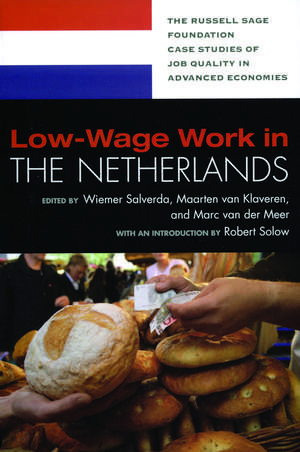Low-Wage Work in the Netherlands: RSF's Project on Low-Wage Work in Europe and the US
Editat de Weimer Salverda, Maarten Van Klaveren, Marc Van Der Meeren Limba Engleză Paperback – 2 apr 2008
The Dutch economy has often been heralded for accomplishing solid employment growth within a generous welfare system. In recent years, the Netherlands has seen a rise in low-wage work and has maintained one of the lowest unemployment rates in the European Union. Low-Wage Work in the Netherlands narrows in on the causes and consequences of this new development. The authors find that the increase in low-wage work can be partly attributed to a steep rise in the number of part-time jobs and non-standard work contracts—46 percent of Dutch workers hold part-time jobs. The decline in full-time work has challenged historically powerful Dutch unions and has led to a slow but steady dismantling of many social insurance programs from 1979 onward. At the same time, there are hopeful lessons to be gleaned from the Dutch model: low-wage workers benefit from a well-developed system of income transfers, and many move on to higher paying jobs. Low-Wage Work in the Netherlands paints a nuanced picture of the Dutch economy by analyzing institutions that both support and challenge its low-wage workforce. A Volume in the Russell Sage Foundation Case Studies of Job Quality in Advanced Economies
Preț: 57.41 lei
Nou
Puncte Express: 86
Preț estimativ în valută:
10.99€ • 11.75$ • 9.16£
10.99€ • 11.75$ • 9.16£
Carte indisponibilă temporar
Doresc să fiu notificat când acest titlu va fi disponibil:
Se trimite...
Preluare comenzi: 021 569.72.76
Specificații
ISBN-13: 9780871547705
ISBN-10: 0871547708
Pagini: 342
Dimensiuni: 152 x 229 x 25 mm
Greutate: 0.51 kg
Editura: Russell Sage Foundation
Colecția Russell Sage Foundation
Seria RSF's Project on Low-Wage Work in Europe and the US
ISBN-10: 0871547708
Pagini: 342
Dimensiuni: 152 x 229 x 25 mm
Greutate: 0.51 kg
Editura: Russell Sage Foundation
Colecția Russell Sage Foundation
Seria RSF's Project on Low-Wage Work in Europe and the US
Notă biografică
WIEMER SALVERDA is director of the Amsterdam Institute for Advanced Labour Studies. MAARTEN VAN KLAVEREN is researcher and consultant at STZ Consultancy and Research. MARC VAN DER MEER is director of studies at the Amsterdam Institute for Advanced Labour Studies.
Cuprins
Authors and Acknowledgementsii Contentsiii List of figuresvi List of tablesvii Wiemer Salverda, Maarten van Klaveren en Marc van der Meer1 1The debate on low pay1 1.1Three core issues: institutions, firm strategies and job quality1 1.2The debate on low pay2 1.3The hesitant debate on work organization and job quality7 1.4Monograph lay out9 Wiemer Salverda11 2Low-wage Work and the Economy11 2.1.The prominent growth of a part-time economy11 2.2Characteristics and evolution of low-wage employment18 2.3Significance of low-wage employment for the national economy23 2.4The probability of being low paid and earnings mobility27 2.5Summary29 Wiemer Salverda31 3Labor-market Institutions, Low-wage Work and Job Quality31 3.1Analyzing and selecting institutions31 3.2Foundations of Dutch labor market institutions: the ¿Polder model¿33 3.3Institutions affecting costs and incomes38 3.3.1Collective labor agreements38 3.3.2Constraints on wage formation: minimum wage and equal treatment43 3.3.3Taxation, subsidies and benefits47 3.4Institutions influencing job content and work organization53 3.4.1 Education and training53 3.4.2Hiring and firing57 3.4.3Labor-supply constraints: migration and early retirement63 3.4.4Health and safety and working hours64 3.5Conclusions68 Maarten van Klaveren73 4Position, design and methodology of the industry studies73 4.1Development of employment in the target industries73 4.2The incidence of low pay by industry75 4.3Firm strategies: high road and low road78 4.4Research design, methodology and contrasts80 Maarten van Klaveren83 5Retail Industry: The Contrast of Supermarkets and Consumer Electronics83 5.1Dutch retail: a first and a closer look83 5.2Methodology84 5.3The economic and institutional context85 5.3.1Employment85 5.3.2Competitive pressures and industry performance87 5.3.3Institutions and labor relations92 5.4Cases in context94 5.4.1Employment, work organization and flexibility94 5.4.2Job quality95 5.4.3Working time97 5.4.4Wages and compensations97 5.4.5Recruitment, training and careering98 5.5Evaluation99 Ria Hermanussen101 6Hotels: industry restructuring and room attendants¿ jobs101 6.1Methodology101 6.2The economic and institutional context103 6.2.1Restructuring, internationalization and standardization103 6.2.2Industry performance104 6.2.3Innovation105 6.2.4Cost-saving methods105 6.2.5Employment and careering106 6.2.6The role of institutions106 6.3Room attendants and their jobs108 6.3.1Backgrounds of room attendants108 6.3.2Outsourcing109 6.3.3The job of the room attendant110 6.3.4Deteriorating job quality115 6.3.5In search of a high road116 6.4 Evaluation118 Marc van der Meer121 7Health Care: Integrated Quality Care sheltered from Cost Control?121 7.1The health-care sector122 7.1.1National regulation122 7.1.2Specialization and budget allocation123 7.1.3Labor market institutions124 7.2Changing work organization and low wage employment131 7.3Working conditions and job quality135 7.4Outlook: costs and benefits of protective labor market institutions137 Maarten van Klaveren and Wim Sprenger139 8Call-center Jobs139 8.1Working in call centers ¿ diverging jobs and wages139 8.1.1Call-center agents: the same job, different conditions139 8.1.2Temp agencies and call-center work140 8.1.3A variety of tasks and wage levels140 8.1.4Methodology141 8.2The economic and institutional context143 8.2.1The emergence of an industry143 8.2.2Recent changes at industry level144 8.2.3Recent changes in firm strategies147 8.2.4Labor relations148 8.3Cases in context151 8.3.1Employment, work organization and job quality151 8.3.2Working hours and contracts154 8.3.3.Wages and compensations155 8.3.4Recruitment, training and careering156 8.4E





